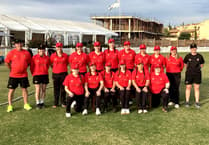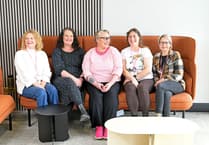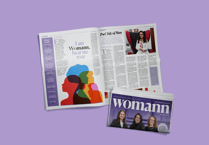There’s no better way to ‘inspire inclusion’, the theme of this year’s International Women’s Day, than to celebrate the companies that are walking the walk.
Step forward Stonehage Fleming Services (IOM) Limited in the Isle of Man, where, for the first time, women now make up the majority of the company’s board of directors.
The composition of the board is simply a reflection of the company’s culture, explained director Maxine Lace: ‘It wasn't about gender at all,’ she said. ‘It was a natural progression, based on a desire from senior management for broader technical skills, experience and governance that we needed for the board.’
This naturally draws into focus the culture at Stonehage Fleming in the Isle of Man.
‘Inclusion happens when people have a real sense of belonging,’ she said. ‘One of the strongest things about our team is how much we support each other. People have a choice of where they work and who they work with, so it's really important that we are a place that people are at ease, that we honour and respect every single one of our staff and what they bring to us.’
With a 30 year career in the industry, where she started as a trainee administrator and has worked her way to board level, Maxine can now act as a mentor, coach and champion for her team.
‘I have been involved with coaching tag rugby and junior hockey, both male and female. I think if you want to do something, just go for it and do it. There should be no gender bias at all. My personal philosophy is strong. You roll your sleeves up and get on with it. It doesn't matter what needs doing, together, we can find a solution.’
So what does inspire inclusion mean at Stonehage Fleming? ‘It’s about creating a legacy that inspires others to dream, learn and connect more. Last year, we launched the initial cohort of our Stonehage Fleming XV, a group of extraordinary women celebrated for their financial, social, cultural and intellectual contributions to society.’
‘We want to create a community where women can connect, learn and collaborate through shared ideas and experiences.’
Meanwhile, as a mother-of-four, Maxine understands the challenges facing working parents and can help drive through the changes in the modern workplace.
‘People used say to me, ‘would you want to travel if you have a young family?’ They were making the assumption that because I had a family, I didn’t want to be an individual with a career,’ she said. ‘I wouldn't want other people to feel like that. I want them to feel that they could have a fair opportunity to do whatever they want to do. Why should being a mum make that any different?’
Stonehage Fleming has a flexible working policy known as ‘3 in 5’ (3 in the office and 2 working from home). Some employees even have non-traditional working hours due to parenting or caring responsibilities. It reflects the fact that ‘Family’ is one of the Group’s core values and that it has adapted its model to support that all-important work life balance. ‘It’s very important to have flexibility, especially for working families,’ Maxine said. ‘Everybody acknowledges and respects the fact that we also have to meet the needs of the business but open and honest conversations around the intersection of work and family life are important and build trust.’
The changes in culture and working patterns have been profound. Nevertheless there are still changes required externally: ‘I still attend a lot of networking events which are male dominated,’ she said. ‘However, you don't see it with the same frequency as you would have done previously. So, there is change but there still more to do.’
Stonehage Fleming continues to work on ways of providing an inclusive environment for all its staff, meeting their diverse range of needs. ‘Values and culture are very important to us. We have an active D&I committee, and five trained mental health first aiders. In our Isle of Man office, a quiet room is available for staff to take a quick break, whether for professional or personal reasons.’ She said ‘We have a close-knit team and remain dedicated to meeting our staff's needs, whether it be through professional qualifications or soft skills development to handle everyday situations.’




